|
|
|
Sort Order |
|
|
|
Items / Page
|
|
|
|
|
|
|
| Srl | Item |
| 1 |
ID:
132900
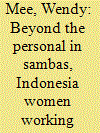

|
|
|
|
|
| Publication |
2014.
|
| Summary/Abstract |
Sambas, a regency in Indonesia's West Kalimantan Province, on the border with Sarawak (Malaysia), provides a distinctive borderlands perspective from which to evaluate the economic and social transformations that accompany Indonesian women's labor mobility. Drawing on village surveys and case studies about women's cross-border activities in Sambas, this article examines the complex inter- section between women's working lives and economic sectors, including those conventionally labeled formal, informal, subsistence, and capitalist. The increasing involvement of young Indonesian Malay women in labor migration has also fostered new marital and familial patterns, which may in turn generate further shifts within the organization of cross-border work and family in the future. These changes illuminate issues of agency and precedence that arise out of local economic histories and family patterns of labor and labor migration. This analysis of both continuities and transformations in women's cross-border labor leads us to attend to women's creative engagement with the opportunities and constraints they face in reaching their personal and economic aspirations. One opportunity, this study shows, was women's proximity to an international border. This location they turned into an economic asset, one that harnessed the productive power of the border.
|
|
|
|
|
|
|
|
|
|
|
|
|
|
|
|
| 2 |
ID:
116867
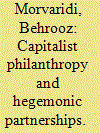

|
|
|
|
|
| Publication |
2012.
|
| Summary/Abstract |
Over the past 10 years individual capitalists have become increasingly involved in philanthropy, setting up charitable foundations targeted at helping to reduce social problems such as poverty, disease and food security. This form of neoliberal capitalist philanthropy is both politically and ideologically committed to market-based social investment through partnerships, to make the market work or work better for capital. The new structures of philanthropy have received much praise in the media for imbuing capitalist business principles into the non-profit sector and for their potential for social transformation. While philanthropic activities may be considered worthy in themselves, this article examines the relationship between giving and business interest and the agency associated with neoliberal capitalist philanthropy. It questions partnerships between philanthropists and private corporations and their motivations for engaging in poverty-related philanthropy. The discussion focuses on capitalist philanthropic foundations' involvement in the process of agricultural commodification in sub-Saharan Africa through the New Green Revolution and genetically modified (gm) technologies.
|
|
|
|
|
|
|
|
|
|
|
|
|
|
|
|
| 3 |
ID:
102372
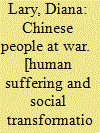

|
|
|
|
|
| Publication |
Cambridge, Cambridge University Press, 2010.
|
| Description |
xiv, 231p.Pbk
|
| Series |
New Approaches to Asian History
|
| Standard Number |
9780521144100
|
|
|
|
|
|
|
|
|
|
|
|
Copies: C:1/I:0,R:0,Q:0
Circulation
| Accession# | Call# | Current Location | Status | Policy | Location |
| 055803 | 940.5351/LAR 055803 | Main | On Shelf | General | |
|
|
|
|
| 4 |
ID:
173444
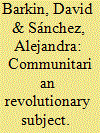

|
|
|
|
|
| Summary/Abstract |
The hope for a unique revolutionary actor in the twentieth century evaporated as a result of the weaknesses of social organisations. This paper examines the potential of an almost-forgotten group of revolutionary actors – collectively organised and deliberately involved in processes of social and productive transformation with a legitimate claim to territory – whose present-day activities involve them in concerted processes to consolidate a different constellation of societies on the margins of the global capitalist system. Indigenous and peasant communities throughout the Americas are self-consciously restructuring their organisations and governance structures, taking control of territories they claimed for generations. They are also reorganising production to generate surplus, assembling their members to take advantage of underutilised resources and peoples’ energies for improving their ability to raise living standards and assure environmental conservation and restoration. These communities are not operating in isolation. They coordinate activities, share information and build alliances. Hundreds of millions of people are participating in this growing movement; they occupy much more than one-quarter of the world’s land area. There is great potential for others to join them, expanding from the substantial areas where they are already operational. Global social networks are ensuring that this dynamic accelerates.
|
|
|
|
|
|
|
|
|
|
|
|
|
|
|
|
| 5 |
ID:
133126
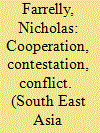

|
|
|
|
|
| Publication |
2014.
|
| Summary/Abstract |
In the period of social and political transformation that followed the election of President Thein Sein, ethnic politics remained a major preoccupation for the Myanmar government, ethnic peoples and the international community. Explaining the varieties of ethnic political interests that are emerging requires a new analytical framework in which the nascent electoral system is given adequate attention. This article argues that cooperation and contestation are now vying with conflict as primary drivers of ethnic politics. To account adequately for the interaction of these concepts, the article introduces various pieces of evidence concerning the different manifestations of ethnic political interests today. It describes an ambiguous situation in which the overall pattern of ethnic politics is changing rapidly. The challenge remains of fully reconciling Myanmar's diverse peoples and including them in one political system.
|
|
|
|
|
|
|
|
|
|
|
|
|
|
|
|
| 6 |
ID:
178951
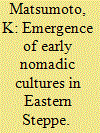

|
|
|
| 7 |
ID:
139133
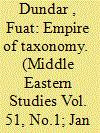

|
|
|
|
|
| Summary/Abstract |
This article examines how the Ottoman Empire through pre-modern surveys (tahrir) and censuses, counted, categorized and classified their population according to ethnic and religious identities, and how the social, economic and political transformation impacted on the change of taxonomy (nomenclature, classification and hierarchization) over time. Through this long trajectory, from the imperial system to the modern state system, the Ottoman government increased its power over its ‘population’, and, simultaneously, its taxonomic power.
|
|
|
|
|
|
|
|
|
|
|
|
|
|
|
|
| 8 |
ID:
179511
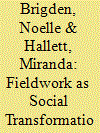

|
|
|
|
|
| Summary/Abstract |
This special issue addresses the urgent need for reflexive introspection about conducting research in violent contexts. To do so, it explores two interrelated dimensions of the places where researchers conduct fieldwork: 1) temporality; and 2) power. In the current political moment, fully engaging with these dimensions of field sites has become an ethical and security imperative, as well as a methodological imperative. Once we put these two dimensions at the centre of analysis, the need to re-conceptualize fieldwork beyond the binaries of here/there and insider/outsider also becomes apparent. Thus, this special issue approaches fieldwork, not only as a means to a research end, but instead, as an opportunity for social action in itself. From a variety of methodological and epistemological positions, the contributors to this issue build on recent feminist work that explores fieldwork’s geopolitical dimensions. Collectively, these interdisciplinary essays argue in favour of reimagining fieldwork as an imaginative and transformative act.
|
|
|
|
|
|
|
|
|
|
|
|
|
|
|
|
| 9 |
ID:
127593
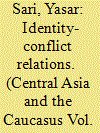

|
|
|
|
|
| Publication |
2013.
|
| Summary/Abstract |
This study aims to describe and explain the relations between identity and conflict by drawing on different theoretical approaches in political science. It examines the questions of whether collective identity, either on a national, civilizational, religious, or social level, is an important variable in trying to understand current conflicts, as well as the prospects for formulating identity-based approaches to conflict. In other words, is it even possible to think about collective identity and conflict simultaneously? This gives rise to another question: Why is collective identity an important factor for explaining the conflict in the Ferghana Valley?
The Ferghana Valley has played a role both in establishing stability in Central Asia and in becoming the starting point of violent conflict throughout the history of the region. The valley became administrationally and ethnically divided into several parts during the Soviet and post-Soviet era. Currently, the tension among the different ethnic, social, and political groups is high because of overpopulation, the increasing scarcity of water and arable land, and the economic hardships and social differentiation that occurred during the political, economic, and social transformation after the Soviet Union collapsed. The Ferghana Valley, at the heart of Central Asia, has become one of the most conflict-prone areas in Central Asia. For these reasons, the valley is a good area for testing the explanatory power of different approaches of political science to explain identity-conflict relations.
Ethnic issues are still extremely important for understanding much of the tension arising in the valley. Not only is there division among the Kyrgyz, Uzbek, and Tajik people, the issue is further complicated by the hostility between different identity-groups and minorities in the region. Additional pressure is arising due to the fact that not only does this tension exist inside each state, it could also escalate to the interstate level.
|
|
|
|
|
|
|
|
|
|
|
|
|
|
|
|
| 10 |
ID:
119293
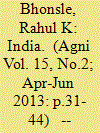

|
|
|
| 11 |
ID:
130727


|
|
|
|
|
| Publication |
2014.
|
| Summary/Abstract |
This special issue examines innovation as social change in South Asia. From an anthropological micro perspective, innovation is moulded by social systems of value and hierarchy and simultaneously potentially transforms them. The articles in this special issue examine a number of innovations in South Asian contexts: the printing press's changing technology and its intersections with communal and language ideologies in India (Peterson); mobile telephony, gender, and kinship in West Bengal (Tenhunen); microcredit and its relationship with social capital in Bangladesh (Uddin); imbalanced sex ratios and the future of marriage payments in north-western India (Jeffery); and how alternative dispute resolution as a social innovation affects battered young wives' life situation options in Sylhet, Bangladesh (Ashrafun and Säävälä). These case studies give insights into how the deeply engrained cultural models and values affect the forms that an innovation process can take. In a social field, actors are not situated symmetrically vis-à-vis an innovation. In South Asian societies that are starkly hierarchical and holistic, innovations may have unpredictable sociocultural repercussions.
|
|
|
|
|
|
|
|
|
|
|
|
|
|
|
|
| 12 |
ID:
130384
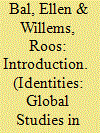

|
|
|
|
|
| Publication |
2014.
|
| Summary/Abstract |
This special issue addresses the imagination of futures 'away from home' in a globalising world. While a growing number of migration scholars have taken into account that migration considerations are always socially embedded and culturally informed, the processes at work among a mounting number of (young) men and women throughout the world, who are convinced that a better life can only be found 'away from home', have been notably understudied. This special issue goes beyond the study of migration aspirations as a question of migration only. It focuses on the specific contexts (in five different countries) within which migration dreams are born, and sometimes even cultivated. It explores the sociocultural embedding of these aspirations by investigating the interpretation of local realities versus global possibilities, and examines how the aspirations of so many worldwide link up to the wider interconnections between globalisation and the sociocultural, political and economic transformations 'back home'.
|
|
|
|
|
|
|
|
|
|
|
|
|
|
|
|
| 13 |
ID:
029681
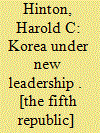

|
|
|
|
|
| Publication |
New York, Praeger Publishers, 1983.
|
| Description |
xi, 282p.pbk
|
| Standard Number |
0030632938
|
|
|
|
|
|
|
|
|
|
|
|
Copies: C:1/I:0,R:0,Q:0
Circulation
| Accession# | Call# | Current Location | Status | Policy | Location |
| 023205 | 951.9043/HIN 023205 | Main | On Shelf | General | |
|
|
|
|
| 14 |
ID:
045339
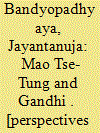

|
|
|
|
|
| Publication |
Bomaby, Allied Publishers, 1973.
|
| Description |
vi, 156p.hbk
|
|
|
|
|
|
|
|
|
|
|
|
Copies: C:1/I:0,R:0,Q:0
Circulation
| Accession# | Call# | Current Location | Status | Policy | Location |
| 011310 | 951.05/BAN 011310 | Main | On Shelf | General | |
|
|
|
|
| 15 |
ID:
025503
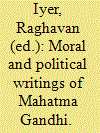

|
|
|
|
|
| Publication |
Oxford, Clarendon Press, 1987.
|
| Description |
xx, 641p.hbk
|
| Contents |
Vol.3: Non-violent resistance and social transformation
|
| Standard Number |
0198247567
|
|
|
|
|
|
|
|
|
|
|
|
Copies: C:1/I:0,R:0,Q:0
Circulation
| Accession# | Call# | Current Location | Status | Policy | Location |
| 028308 | 954.035092/IYE 028308 | Main | On Shelf | General | |
|
|
|
|
| 16 |
ID:
126747
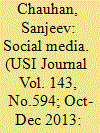

|
|
|
| 17 |
ID:
140515
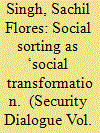

|
|
|
|
|
| Summary/Abstract |
In this article, I show that credit scoring, although not explicitly designed as a security device, enacts (in)security in South Africa. By paying attention to a brief history of state-implemented social categories, we see how the dawn of political democracy in 1994 marked an embrace of – not opposition to – their inheritance by the African National Congress. The argument is placed within a theoretical framework that dovetails David Lyon’s popularization of ‘social sorting’ with an extension of Harold Wolpe’s understanding of apartheid and capitalism. This bridging between Lyon and Wolpe is developed to advance the view that apartheid is a social condition whose historical social categories of rule have been reproduced since 1994 in the framing of credit legislation, policy and scoring. These categories are framed in the ‘new’ South Africa as indicators of ‘social transformation’. Through the lens of credit scoring, in particular, it is demonstrated that ‘social transformation’ not only influences, shapes and reproduces historical forms of social categories, but also serves the state’s attempt to create and maintain populations as risks.
|
|
|
|
|
|
|
|
|
|
|
|
|
|
|
|
| 18 |
ID:
114727
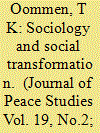

|
|
|
| 19 |
ID:
164971
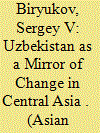

|
|
|
|
|
| Summary/Abstract |
Central Asia is anticipating a transformation related to the need for further multifaceted modernization. However, different conditions dictate different strategies. The development model of Uzbekistan was mostly defined by Islam Karimov, whose death marked the beginning of profound changes associated with the transformation of the sultanistic regime.
|
|
|
|
|
|
|
|
|
|
|
|
|
|
|
|
|
|
|
|
|